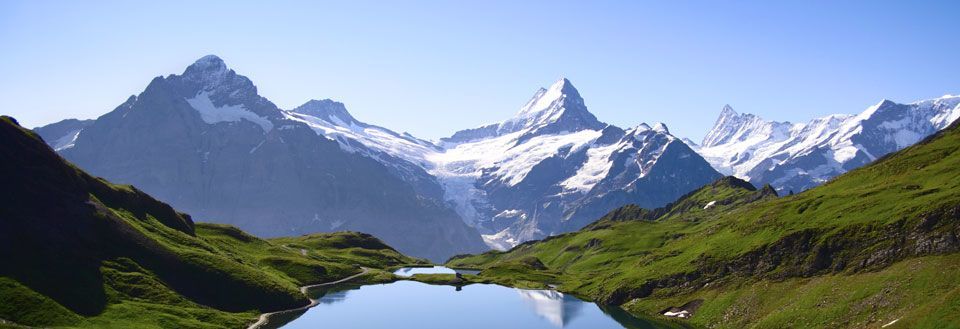Europe's cosy corner, Switzerland, is bounded by the Alps, and is probably most famous for clocks, cheeses and 'discrete' banks. The traveller will discover that there is much more to it though. Switzerland has not been called Europe's 'classic holiday country' for centuries without a reason.�
Schweizerische Eidgenossenschaft (German)
Bern (129,400)
41,285 sq km
German (70%), French (19%) and Italian (8%).
Roman Catholic and Protestantism
7,000,000
Republic
Rivers, valleys and the tall Alps - which make the weather somewhat unstable - cover Switzerland. North of the alps the climate is like the rest of northern Europe, whilst south of the Alps reminds very much of the Mediterranean.�
Most people probably connect a holiday in Switzerland with a ski holiday. Whether you go to Switzerland for winter sports or to enjoy the fresh mountain air and experience the country's culture, you can do it both summer and winter.�
Schweiz
Swiss franc (CHF)
Switzerland has many Internet cafés scattered all over the country and in the major cities.
Police (117)
Fire department (118)
Ambulance (144)
Rescue helicopter ((01) 3831111)
Although tips generally aren't expected, and most restaurants, taxis and the like include a service fee in the bill, a small amount will always be appreciated.
When it is 12.00 in the UK it is 12.00 in Switzerland.�
Weight: kilogram
Length: metre
Volume: litre
Show common courtesy and always ask before taking pictures of the locals.
The tap water in Switzerland is safe to drink, but it is not advised to drink directly from streams. Bring a bottle of water when going hiking.
220 volts AC/ 50 Hz.
Common courtesy and respect will get you a long way in Switzerland.
Banks are open 8.30-16.30 (Monday to Friday).
Shops are open 8.00-12.00 and 13.30-18.30 (Monday to Friday). Only open to 16.00 on Saturdays.
Swiss cuisine can be both stimulating and varied, depending on the part of the country you are in. It's location, bordering France, Germany and Italy, has rubbed off on the menu, which besides numerous cheeses, is dominated by fish, sausages and various flesh dishes. Moreover the Swiss produce a legendary chocolate which can be very much worth tasting.
Switzerland also produces some excellent wines.
�
The facilities for the disabled in Switzerland are generally very good, and the more expensive hotels almost all have lifts. The Swiss tourist agency has published a pamphlet for disabled travellers.�
New Year's Day, 1 January
National Day, 1 August
Christmas, 25 and 26 December
In some parts of Switzerland, both 2 January and 1 May are also holidays.
There are about 500 camping sites in Switzerland.
There are many excellent hotels in Switzerland, and of a high quality, too. It is advisable to book your room in advance.
The Swiss hostels are open to everybody, but young people under 25 have precedence.
Switzerland has many, very popular, holiday homes and mountain cabins and you should book these a long time in advance. This can be done through the Swiss tourist agency.
There are also a number of spas and youth hostels. More information can be obtained at the Swiss tourist agency.
The local airline Swissair and Crossair take care of all domestic flights. Flying is fast, but very expensive, which is why most people use the car or train instead.
Switzerland has a very good railroad, maintained by the Schweizerische Bundesbahnen (SBB)
Swiss taxis drive with a taxi-meter on both long and short trips.�
The road system in Switzerland is good, although many of the narrow mountain roads can seem frightening. In Switzerland traffic keeps to the right and you should equip your car with a so-called Autobahn vignette before entering the country. You also have to pay for driving through the two tunnels connecting Switzerland and Italy. If you drive in the winter, winter tyres and snow chains are a must, even though you can often get the car transported by train over the passes that are closed due to the weather.You can rent a car in all major cities in Switzerland, from your hotel, the airport or the train station.
A lot of the transportation in the ski resorts is by mountain railway, which is often a great experience.
